Dendrimers & small molecule applications
Laboratory training #3 aimed to create the links between DGB/UL, RSU and KIEPOR institutions; raising research profile of the staff through the interaction with the leading partners in the field of bionanotechnology. The 1-st PART of current training introduced the biophysical complexation techniques to explain the possibilities of stable nanosystems formation with the using of dendrimers as delivery vehicles for nucleic acids as drugs, in example, DNA which can be used in anticancer therapy.
Results (Part I)Guest researchers tested the formation of different dendrimer-DNA complexes and characterized formed nanosystems using circular dichroism and agarose gel electrophoresis methods. The ratios (w/w) between complexes components have been established. The seminars with obtained results presentation and discussion were organized. The trainees examination showed the level of masterd skills obtained during training has been performed.
Aims (Part II)The Part II of the Training in Lodz (DGB/UL) was aimed to master the trainees from KIEPOR by number of biophysical techniques which can be used for nanocomplexes characterization. To educate the participants for proper using of laboratory devices and equipment.
Results (Part II)Nanosystems formed on the base of dendrimers and anticancer gene material were carefully characterized. Using the fluorescence technique the binding properties of dendrimers were analyzed. By the Dynamic light scattering method the surface potential and size of dendriplexes were evaluated. Training included the experimental laboratory ”wet” and theoretical ”dry” parts. During wet part trainees were obtained methodological skills in the field of nanobiophysics. Dry part introdused some theoretical aspects such as planning of experiments; results discussion; published literature analysis. The PART II of training #3 was compleetd by trainees examination.
Aims (Part III)By the presentation of new technologies in the field of in vitro transfection to teach Latvian and Ukrainian trainees the ways of analyzing the nanobiomolecules internalization parameters. Training consisted of tests in vitro in cell lines to define which nanoparticle-packed pVax-Luc and iRFP670 reporter plasmid complexes provide the best reporter expression in cell culture.
Results (Part III)During that part of the training (third) the trainees from Latvia (RSU) and Ukraine (KIEPOR) have been schoolled with the new in vitro methods aimed to conduct the transfection characteristics of used nanoparticles to transfect the different kinds of cells. Two cell line models were used in this study, N2a, mouse neuroblastoma and mHippoE-18, embryonic mouse hippocampal cell line. Moreower participants of training have studied the cell cytotoxicity methods like MTT test. On the base of results obtained the CBD dendrimer have been suggested as potential carrier for delivering anticancer gene material into the cancer cells. Training was followed by public seminar with the presence of Ph.D. and Master students of Lodz university and participants from Latvia, Ukraine, Poland, Kazakhstan, Russia, India, and Belarus. The training certificates were handed at the end of the training.


